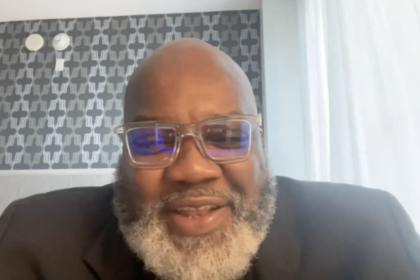
Lenée Voss, radio talk show host, writer, blogger and activist, has been in choice social media circles since bloggers were the only change agents challenging traditional media. Her alter ego, @DopeGirlFresh, Voss’ most public voice, has emerged on Twitter as a vicarious lionheart who speaks the people’s truth. Voss is fearless in the way she manages to exert her feminism by way of openly sharing her sexual desires (her handle was once Straptain America), advocating for Black women’s equality in pop culture or emergency crowdfunding for transgender youth seeking housing.
On any day, analytics will find her reach in the millions, with hundreds of thousands of retweets and likes. Yet, while keenly aware of her influence, Voss spoke with rolling out about her choice to buck traditional influencer models and use her powers for justice.
How did you become a Twitter influencer?
Before there were influencers, there were bloggers and I kind of fell in the middle of that. I think for some folks it was a natural shift, and then others [felt the need] to get on the internet and get … out there in a certain way. I am very much on paper a regular person, but the internet was where I could go as a writer without trying to pitch, without waiting for somebody to give me a green light to write a feature.
What’s the best way for brands or influencers to come out of “cancellation” when they do something offensive?
Do not act like it didn’t happen. You have to acknowledge it and really take a thoughtful approach to it. Even if you post a placeholder saying we deleted the tweet, it was wrong. We have to regroup and look at what we really did wrong so we don’t do it again.
Always be prepared to talk about it later because it’s going to come up. Somebody’s going to ask about it again, and you don’t necessarily need a canned response, but you should always have a skeleton of a response.
Read the d— room, pay attention to who you’re talking to and how you talk to them.
You’ve raised thousands on Twitter for marginalized people, whether it’s a homeless transgender man or woman, or a single mother who can’t pay her rent. Would you like to see philanthropy models move more in this direction?
I do, to an extent. I don’t think there’s anything wrong with operating budgets being fulfilled by donations, but most people don’t know that the donations are keeping the doors open. I don’t think there’s enough transparency.
I can say flat out that this is what this person needs, and this is urgent. And people respond to it, and I think they respond to it because I’m not making a show of saying what I need to say. I’m just saying it.
I value the opportunity to be able to help people and I know for a fact that I can be incredibly persuasive without browbeating, without manipulating.











